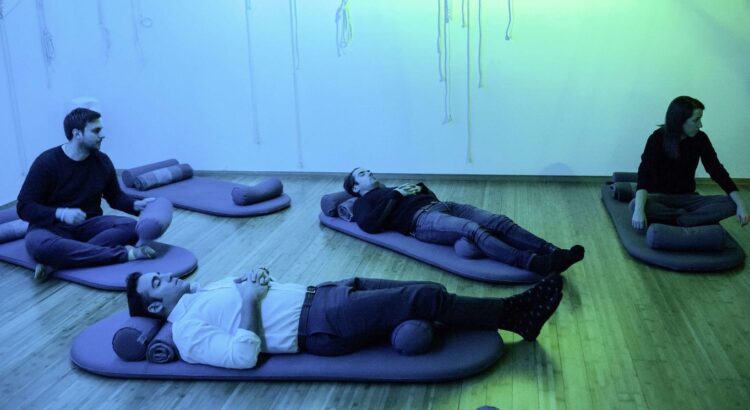What are the benefits of mindfulness meditation? Anxiety disorders, which are characterized by intense and long-lasting anxiety, are common among the population. According to Inserm, 21% of adults would be affected during their lifetime. Women are twice as affected as men. These disorders can take different forms (generalized anxiety, panic disorder, agoraphobia, etc.). They express themselves through a wide range of psychological and physical symptoms. These include irritability, irrational fear, difficulty concentrating, inability to make plans, digestive disorders, insomnia, dizziness, etc. Not only do anxiety disorders have a strong impact on daily life, but they increase the risk of suicide and disability.
Mindfulness Meditation: Focusing on the Present Moment to Relieve Anxiety

A regular and supervised practice of mindfulness meditation is as effective as an antidepressant in relieving anxiety. Credits: Shutterstock/fizkes
Cognitive-behavioral therapy and/or drug treatment (based on anxiolytics or antidepressants) is generally recommended. But many patients struggle to get these drugs or can’t stand the side effects (nausea, sexual dysfunction, drowsiness, etc.). A clinical trial recently demonstrated the healing potential of another approach. It is meditation mindfully (or mindfulness in English). It is a practice of focusing one’s attention on the present moment. We are interested in what is happening in ourselves and around us, without the slightest judgment.
Mindfulness-based therapies are already practiced sporadically. However, their relative effectiveness (compared to standard drugs) had never been evaluated. To fill this gap, researchers at Georgetown University Medical Center recruited 276 patients, average age 33, with anxiety disorders at three hospitals in Boston, New York and Washington. They randomly assigned them to stress reduction therapy. It was based on either mindfulness (MBSR) or escitalopram. It is a selective serotonin reuptake inhibitor antidepressant commonly prescribed to treat the Depression and anxiety.
Read also: Television violence before the age of 3 can cause psychological disorders until adolescence
The trial lasted eight weeks. The MBSR consisted of 45 minutes of daily exercises that had to be done at home. There was also a two and a half hour “face-to-face” course each week, as well as a “retreat” day in the fifth or sixth week. The antidepressant group received daily doses of 10 to 20 mg of escitalopram.
The researchers assessed the participants’ anxiety symptoms when they enrolled and after eight weeks. They also performed follow-up assessments at 12 and 24 weeks after enrollment.
A 30% reduction in the severity of the disorders
Of the 276 patients recruited, 208 completed the trial (8% of patients in the escitalopram group dropped out due to adverse effects). The results, published in November in the magazine JAMA Psychiatry, reveal that anxiety symptoms decreased in patients in both groups. At baseline, on a scale of 1 to 7 (7 being associated with severe anxiety), symptom severity averaged 4.5 for both groups. The researchers report an average reduction of 1.35 points for the MBSR group and 1.43 points for escitalopram. Results that are considered statistically equivalent.
In other words, both approaches resulted in a significant decrease of about 30% in the severity of patients’ anxiety disorders. MBSR therefore appears to be quite legitimate for treating anxiety. Therefore, it should be managed in the same way as traditional treatments.
Read also: Meal times can affect mental health
” Our study provides evidence for clinicians, insurers, and healthcare systems to recommend, include, and provide reimbursement for mindfulness-based stress reduction as an effective treatment for anxiety disorders. Indeed, mindfulness meditation is currently reimbursed by very few providers,” explains Elizabeth Hoge. She is director of the anxiety disorders research program, associate professor of psychiatry at Georgetown and first author of the study.
” Once you are aware of an anxiety reaction, you can choose how to handle it. It’s not a magic cure, but it’s a kind of training that lasts a lifetime. Instead of my anxiety progressing, it went the other way, and I’m very grateful for that. “. This is what a patient who has been practicing MBSR for several years now testifies, after having participated in a previous study on this therapy.
An approach that requires more effort
Mindfulness meditation has several benefits. First of all, it is free from unwanted side effects (unlike drugs). In addition, it can be practiced almost anywhere and at any time (as soon as the patient feels the need). The practice is also now easily accessible via many smartphone applications, even for the uninitiated. ” One of the great benefits of mindfulness meditation is that it doesn’t require a clinical degree to train someone to be a mindfulness facilitator. In addition, the sessions can be carried out outside of a medical setting,” adds Dr. Hoge.
However, as the specialist points out, the practice requires a significant personal investment. ” Not everyone is willing to invest time and effort to complete all the necessary sessions and exercise regularly at home, which enhances the effect “, she specifies.
Read also: Three-quarters of dogs suffer from anxiety disorders, study claims
Meditation apps or other interventions by videoconference can be interesting. However, the researcher remains skeptical about the effectiveness of these exercises, which are perhaps a little too individual. For maximum efficiency, it is essential, according to her, to keep moments of direct exchange with the facilitator and the other practitioners.
Note that the clinical trial ended before the start of the COVID-19 pandemic. The researchers, however, conducted a second phase of the study during the pandemic. It was precisely to offer the MBSR by videoconference. This will be the subject of future analyses. The team also plans to explore the effects of MBSR on sleep and depression.
We would love to say thanks to the author of this write-up for this incredible content
Mindfulness meditation would be as effective as antidepressants – Science and life
Discover our social media profiles and other pages related to it.https://nimblespirit.com/related-pages/

